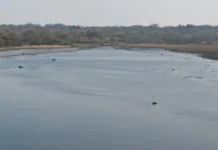Dry grass and gorse fires are dangerous and costly
Mid and West Wales Fire and Rescue Service are using the emergence of the warm spring weather to remind the public of the dangers and consequences of dry grass and gorse fires during March and April.
Every year the Service sees a huge rise in the number of grass and gorse fires during the spring months. Warm and dry weather conditions mean that these fires can spread very quickly and can often prove difficult to put out, requiring a large amount of resource.
Arson Reduction Team Leader Steven Davies said: “Grass and gorse fires can have a major impact on the community, posing a risk to life and property and destroying wildlife habitats.
“Many of the grass and gorse fires we attend are started deliberately and we want to remind the public that fire-setting is a criminal offence. We work closely with the police to ensure that cases of deliberate fire-setting are investigated fully and, where possible, those responsible are prosecuted.
“A small grass fire can very quickly turn into a major incident, tying up valuable resources. We are asking the public to be vigilant for grass and gorse fires and to consider the dangers and consequences of deliberate fire-setting.”
Mid and West Wales Fire and Rescue Service have been visiting schools across the region to educate pupils about the economic and environmental costs of deliberate grass fire-setting. The Service is also providing specialist help and advice for parents concerned about possible fire-setting behaviour in their children.
Help keep news FREE for our readers
Supporting your local community newspaper/online news outlet is crucial now more than ever. If you believe in independent journalism, then consider making a valuable contribution by making a one-time or monthly donation. We operate in rural areas where providing unbiased news can be challenging. Read More About Supporting The West Wales Chronicle























